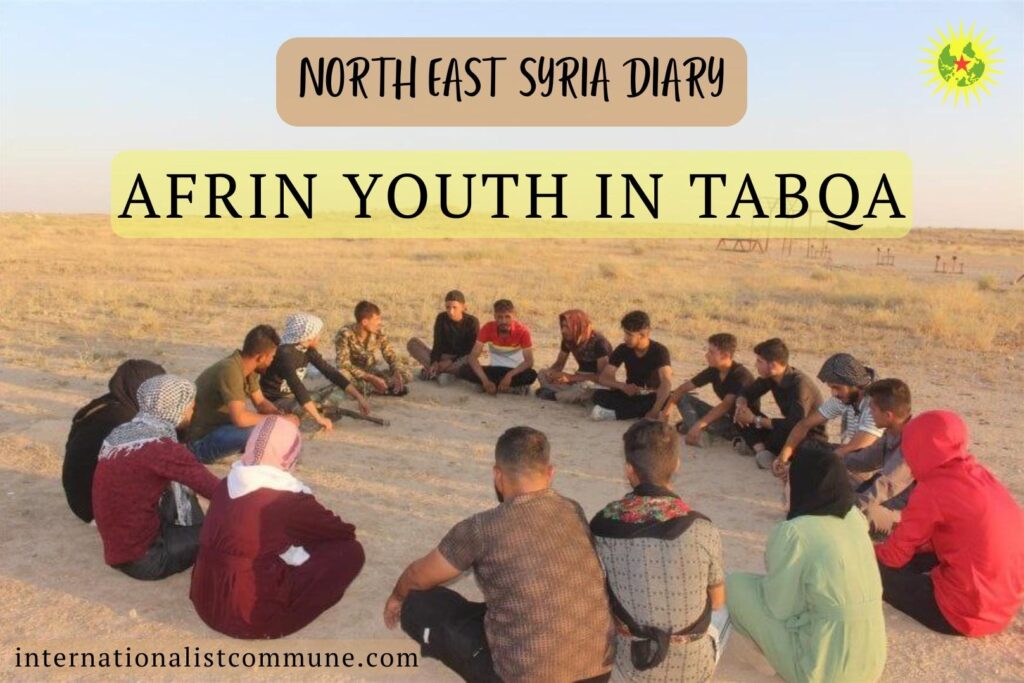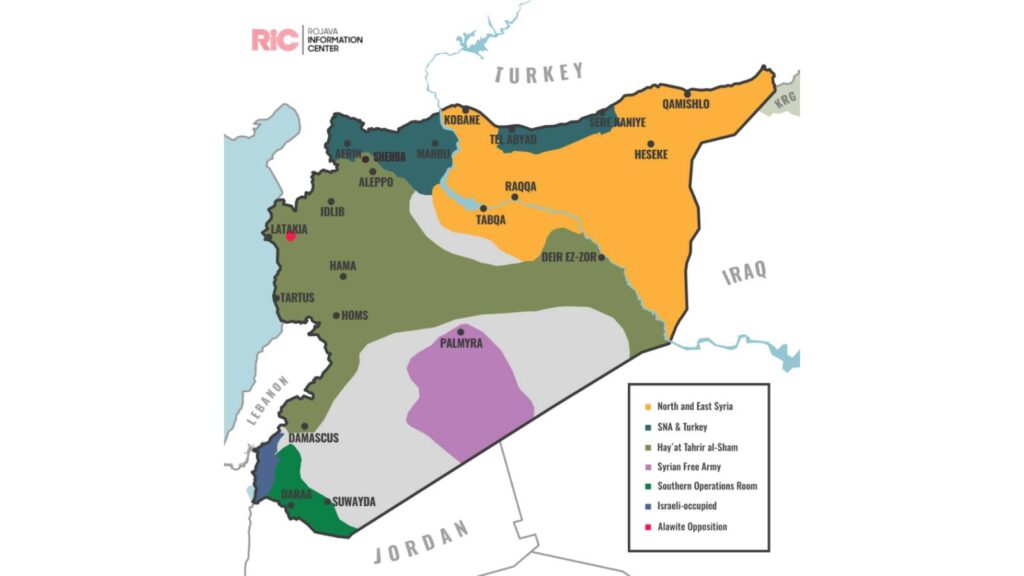Article in other languages: ITA – GER
We will spend a few days in Tabqa, a large Arab majority city on the bank of the Euphrates river, not far from Raqqa. Since its liberation from the Islamic State in 2017, Tabqa is part of the Democratic Autonomous Administration of North and East Syria (DAANES). For these days we
will stay in the center built up by the youth of Shehba and Afrin. The people of these two places were displaced in different times. In 2018, Afrin was occupied by the Turkish State, so a big part of the population escaped from the violence of the Turkish state’s mercenaries by going to Shehba in south of the Afrin region and north of Aleppo.

In the end of 2024, with the fall of the Assad Regime, the war in the north of the country started again. A lot of Afrin’s population, hundreds of thousands of civilians who had taken refuge in Shehba, were forced again to move, this time together with the population of Shehba, to Tabqa. It is difficult to say how many families arrived in Tabqa, but at least several tens of thousands. The various structures of the Autonomous Administration quickly tried to free space for everyone. Together with the refugee camps made of tents, a lot of schools or old regime buildings were turned into shelters. Both in and outside of the city, there are a lot of these kinds of camps, apparently more than a hundred.
The situation in the city for these people and the rest of the population is of course really hard. Over the course of very few days, the demographic situation in the city suddenly changed. The Kurdish population of Shehba and Afrin is historically highly organized in the paradigm of the Kurdish freedom movement and politically aware. As soon as they arrived in the refugee camps of Tabqa, they directly re-established communes, popular councils and autonomous women’s and youth organizations. These developments started in a traditionally almost entirely Arab city, witch is still impacted by the traumatizing years of IS-occupation. The concept of self-organization and especially the ideology of women’s liberation have been taking their first steps there since only a few years.

The youth center we are staying in is a rectangle ground floor building of several rooms, facing a large central cohort. It is modest, a big part of the paint on the walls is peeling off and the furniture is minimal. The center exists only since a few months, since the fall of the regime. Seems like who is living here is not going to make it their home, their home is elsewhere. We are welcomed by five comrades, two young women and three young men ranging in age from 14 to 20, all wearing a mixture of civilian and military clothing. They spark curiosity and sympathy in me with their aura of seriousness and simplicity. We put some mattresses on the floor to sit. Even if the kitchen is quite empty, the comrades give a lot of effort to serve tea and then we start cooking some Afrin food together. They tell us that they all came from Afrin, and that they were recently displaced from Shehba where they had been residing since 2018. Their families are displaced as well, all in different places, some missing since months. They decided to re-establish their organization in Tabqa, to continue living together as a commune and to be close to their people and their home, Afrin. The boys are more silent, but Rona is a very talkative companion, she has an intelligent and sharp gaze. For some years, she doesn’t know where her parents are, but still she has a determined personality. When we met the first time, she looked in all of our eyes, asking for our names and where we are from. Then Rona proposed to sing songs together. Our repertoire is limited and repetitive but still we try, when her turn comes she bursts into laughter and apologizes because she only knows children’s songs. At 14 years old, she expresses a powerful and passionate youth spirit. Their days pass slowly, mostly inside the common room enjoying the few hours of electricity which allow the air conditioner to run, discussing together about the problems of the youth and which solutions. They all seem to be waiting for something to happen, maybe for the moment when they will be able to go to a liberated Afrin again.
Very often, young men and women of Afrin, more then every other youth from other places, experienced military educations, because of the necessity of being able to defend their own lives and their land. Many of them fought, lost friends and family. Getting to know their reality allows me to understand a very simple and important thing: a serious insistence towards a political solution, the cease-fire and all the diplomatic relations with the enemy are rooted and possible because the society is not defence-less. The society, as a political subject itself, is searching for other ways than the war but nevertheless is ready for it at any moment. The Kurdish youth expresses this reality: the political and diplomatic phase is guaranteed by a youth which is ready and aware for everything, even the military self-defence.
I make friends with Nûman, age uncertain between 16 and 18, one of the few who once he arrived in Tabqa started studying again. Tomorrow he has a geography exam and apparently it doesn’t stress him out at all. I ask him a few questions reading from his notebook, one notebook for all subjects, full of scribbles, it reminds me of mine in high school. The possibility to attend the exams has been granted by the municipalities of the Autonomous Administration for the displaced people even if it’s summer. In the Arab cities like Tabqa since there are not enough Kurdish teachers, the people from Shehba and Afrin who are displaced as well, organized themselves to continue the school programme. He explains to me how difficult are certain subjects, I don’t grasp everything because I speak little Kurdish but I reply that I also had the same difficulties with them. We had very different life experience but there are some things that don’t change too much from place to place. I‘m really impressed by his will to continue studying even though he is facing all these difficulties. I wonder if he will at least wear civilian clothes to school.
The sun goes down, the center borders with a nice soccer field with nets and concrete steps. We sit on the grass and he starts singing songs from the Afrin resistance they all know, they are beautiful and heartbreaking even if I don’t totally understand them, finished with one starts with the other, I stay listening in silence until it’s time to go to sleep.